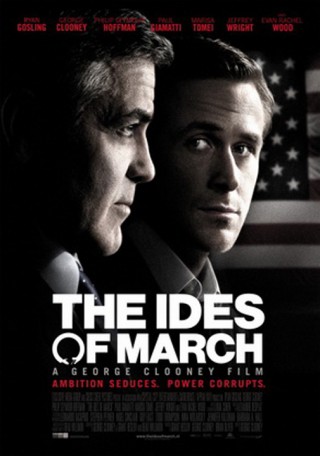
By Rachel Ambelang
Guest Contributor
I have never really been one for the political scene, but it seems like everyone, including myself, takes an interest in the underbelly of the American government. From the conspiracy theorists to the romantic idealists, everyone has an opinion of how our elected officials actually behave behind the scenes. The film “The Ides of March” deals specifically with the presidential campaign.
Stephen Meyers (played by Ryan Gosling) is a young campaign advisor to Governor Mike Morris (George Clooney) who is trying to win the Democratic nomination for president. Meyers is not yet jaded by the shady dealings of the campaign trail, and truly believes that Morris is the best thing for the well-being of this country.
Politics is Meyers’ life, and everyone knows that he is the best at what he does, but when the political game begins to show people for who they really are, Meyers has to try and define what the hazardous, blurry line is between his job and his morality.
This story is, while book ended by the theme of corrupt politics, ultimately about how far a person can be pushed. Meyers not only has a duty to the governor to do his absolute best in this campaign, but he also wants this election for himself. Aiding the governor in this victory would secure Meyers a job at the White House, the job he has been working toward all his life.
At the same time, he questions if his career is worth neglecting his ethics and becoming a part of the system he swore to be the one exception to. We all think we have grounded morals, but when reputations, jobs and futures are on the line, will we really stand up for what we believe or are we all capable of doing unimaginable things?
“The Ides of March” marks George Clooney’s fourth film as both director and star, and the multitalented man delivers again. Ryan Gosling also gives an outstanding performance and reminds the audience once again of his ability to play an extremely conflicted character facing a range of emotions.
I was impressed by his ability to truthfully play Stephen’s anguish and confusion at the unfolding situation back and forth with his sense of responsibility to his work.
There is more than one plot twist in this movie that, for the first time in a long time, I really was not expecting. Don’t worry if you are like me and are not a political buff. The plot, while it does contain some campaign jargon, does a great job of keeping the audience informed. More importantly, it makes sure that viewers do not miss the gravity of the conflicts both in their vitality to the story line and in the emotional journey of the characters.
What I loved most about this plot line is how it plays with our own definition of immorality. No one starts out in the film, as almost no one does in life, deciding to be the bad guy. It all starts with a slight slip in the wrong direction.
Even if we don’t mean to, we can find ourselves in the midst of a devastating situation, much like Meyers does, unable to find the right way out. Almost all of us have had that moment when we look back and ask ourselves, “How in the world did I let it go this far?”
Overall, I was extremely pleased that the film refrained from being too preachy about the possibility of corruption within our governmental system and instead stuck to an interesting storyline with some deeper themes that any audience could delve into.
Reviews in the Lariat represent only the viewpoint of the reviewer and not necessarily those of the rest of the staff. Please send comments to lariat@baylor.edu.






